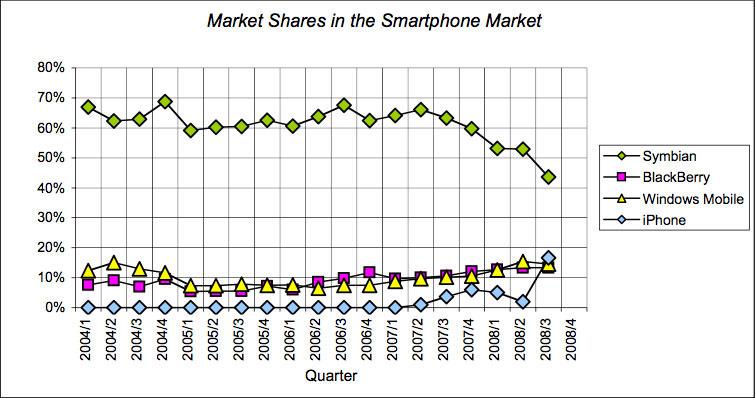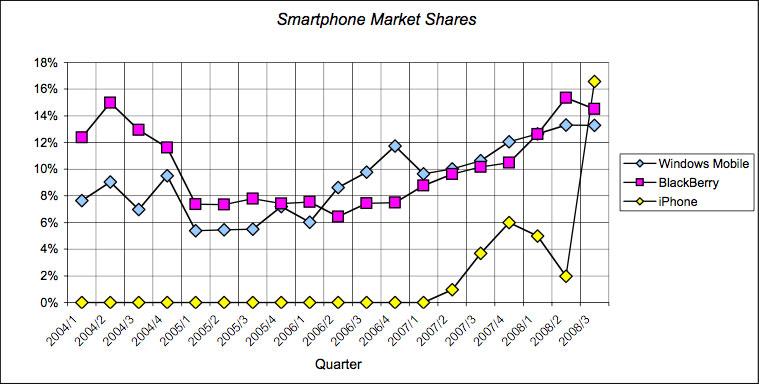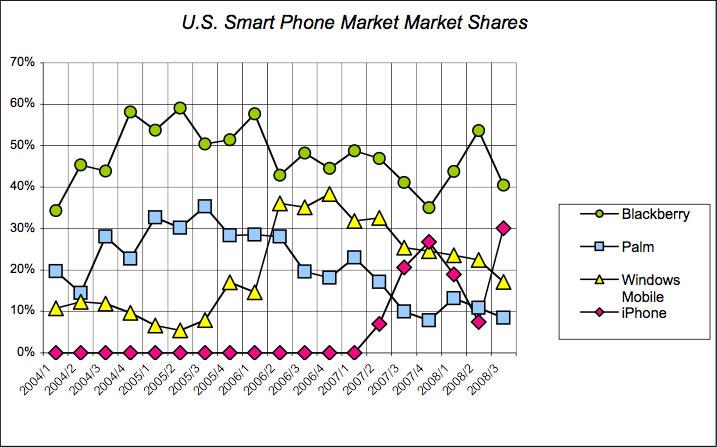In a report issued Tuesday, Needham & Co. noted that worldwide smartphone shipments increased 28.6% during the three-month period ending September, boosting the multi-function handsets' share of the overall mobile phone market to 13.8%, up from 12.2% in June and 11.2% a year ago.
"Apple’s iPhone 3G, introduced in July, is the only reason smartphone growth did not slow in September," explained analyst Charles Wolf. "Apple shipped almost seven million iPhones in the quarter, accounting for all of the sequential shipment growth in the quarter and then some."
That said, Wolf acknowledged that 2 million of those near 7 million iPhones represented shipped, but unsold, channel inventory. Without this excess inventory fill, "sales growth would undoubtedly have decelerated in September," he said, adding that he believes December quarter smartphone growth may ultimately produce disappointing growth numbers as a result.
Even if iPhone sales decline along with overall smartphone shipments during the December quarter, Wolf said the competitive dynamics of the smartphone market suggests the Apple handset won't be a one-quarter wonder as feared by some industry watchers. That's largely in part because the iPhone, along with Research in Motion's BlackBerry offerings, are winning the battle of business models in the market through their tightly integrated ecosystems of hardware and software.
By contrast, "Windows Mobile, Android and now Symbian are relying on handset manufacturers to integrate these operating systems with smartphones of their own design," he said. "The September shipment numbers indicate that the BlackBerry/Apple model is clearly winning at this stage of the conflict."
For example, Wolf points out that both Apple and RIM shipped more units than Windows Mobile despite the fact that over 30 handset manufacturers license the Microsoft operating system. Meanwhile, he notes that Symbian’s dominance began to fade during the past year, first with a surge in BlackBerry sales and next with the introduction of the iPhone.
"Together, BlackBerry and the iPhone captured 31.1% of the smartphone market in September, up from 14.3% a year ago," he said. "Symbian is likely to face further competitive pressures going forward when many of the industry’s leaders introduce phones running on Google’s Android platform."
And while it's too early to predict who will emerge victorious in the battle between Apple and RIM, the Needham analyst pointed to one metric that can often prove telling because it translates into a stream of upgrades down the road: new activations.
"On this metric, the iPhone won the activation game hands down," he said.
During its August quarter, RIM sold 6.13 million BlackBerries, of which 3.52 million were upgrade sales while 2.61 million were new activations. On the other hand, Apple's exclusive US wireless carrier activated 2.4 million iPhone 3Gs during a similar time period, in addition to approximately 2.49 million activations internationally. [Editor's note: this logic may be misleading given that many new iPhone 3G activations were the result of upgrades from the original iPhone.]
"Worldwide iPhone activations, then, totaled 4.9 million phones," Wolf said. "This was almost twice the number of phones BlackBerry activated in RIM’s August quarter."
 Katie Marsal
Katie Marsal









-m.jpg)






 Marko Zivkovic
Marko Zivkovic
 Mike Wuerthele
Mike Wuerthele
 Christine McKee
Christine McKee
 Amber Neely
Amber Neely
 Sponsored Content
Sponsored Content
 Wesley Hilliard
Wesley Hilliard

 William Gallagher
William Gallagher









18 Comments
Good Numbers. And that's all with one phone. While all other companies have 20-30 different models. Simplicity wins.
Good Numbers. And that's all with one phone. While all other companies have 20-30 different models. Simplicity wins.
Not only is it being done with one phone, but with one carrier, at least here in the States and in most international markets. RIM, Palm, et al, are all on every network imaginable, which makes what the iPhone is doing all the more impressive.
Not sure I follow the logic of the last statement. RIM sold 6.1 million, 2.6 million to new customers (a little over 40%). AT&T sold 2.4 million iPhones, 1 million to new customers (a little over 40%).
Hands down? Wouldn't this seem to indicate that RIM and Apple were pretty much equal in this regard, other than a one-time international bump for Apple from entering new markets?
"Microsoft CEO Steve Ballmer, alongside Nortel CEO Mike Zafirovski, spoke with CNBC Business News' Scott Wapner today regarding a variety of subjects, including Microsoft's Zune and Apple's iPhone and iPod:
Wapner: Steve, let me ask you about the iPhone and the Zune, if I may. The Zune was getting some traction and Steve Jobs goes to Macworld and he pulls out this iPhone. What was your first reaction when you saw that?
Ballmer: (laughs) $500 full-subsidized with a plan! I said that is the most expensive phone in the world and it doesn't appeal to business customers because it doesn't have a keyboard which makes it not a very good email machine. Now, it may sell very well or not, I, you know. We have our strategy, we've got great Windows Mobile devices in the market today, we, you can get a Motorola Q phone now for $99, it's a very capable machine, it'll do music, it'll do, uh, Internet, it'll do email, it'll do instant messaging. So, I, I kinda look at that and I say, well, I like our strategy. I like it a lot.
Wapner: How do you compete with that though? He sucked out a lot of the spotlight in the last few weeks because of what happened at Macworld, not only with the iPhone, but with the new iPod. How do you compete with that, with the Zune?
Ballmer: Right now, well, let's take phones first. Right now we're selling millions and millions and millions of phones a year, Apple is selling zero phones a year (half smile). In six months, they'll have the most expensive phone by far ever in the marketplace (laughs) and let's see (shrugs), you know, eh, what's the expression, let's see how the competition goes. In the case of music and entertainment players, Apple ob.., uh, absolutely has a preeminent position. We said we wanna be in this market, there's a lot of reasons why there's synergy with other things that we're doing, we think we've got some unique innovations - particularly what we're doing with community, with wireless networking. And, we came into the market, a market in which they are very strong, and we took, I don't know, but I think most estimates would say we took about 20-25% of the high end of the market. We weren't down at some of the lower price points, but for devices $249 and over we took, you know, let's say about 20% of the market. So, I feel like we're in the game, we're driving our innovation hard, uh, and, uh, okay, we're not the incumbent, he's the incumbent in this game, but, uh, at the end of the day, he's going to have to keep up, uh, an agenda that we're gonna drive as well.
Wapner: You still feel like you can be very competitive in that space?
Ballmer: Sure. Absolutely. If we didn't think there was transformation going on, we woudn't be playing."
If their sales keep going exponentially, unfortunately everyone might as well just give up. \